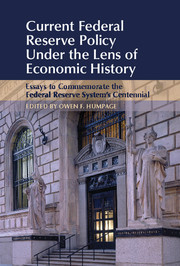 Current Federal Reserve Policy Under the Lens of Economic History
Current Federal Reserve Policy Under the Lens of Economic History Book contents
- Half title page
- Studies in Macroeconomic History
- Title page
- Copyright page
- Dedication
- Contents
- Contributors
- Discussants at the Conference
- Preface
- Introduction
- 1 The Uses and Misuses of Economic History
- 2 Federal Reserve Policy Today in Historical Perspective
- 3 How and Why the Fed Must Change in Its Second Century
- 4 The Lender of Last Resort
- 5 Close but Not a Central Bank
- 6 Central Bank Independence
- 7 Politics on the Road to the U.S. Monetary Union
- 8 U.S. Precedents for Europe
- 9 The Limits of Bimetallism
- 10 The Reserve Pyramid and Interbank Contagion during the Great Depression
- 11 Would Large-Scale Asset Purchases Have Helped in the 1930s?
- 12 A Tale of Two Countries and Two Booms, Canada and the United States in the 1920s and the 2000s
- 13 It Is History but It’s No Accident
- 14 Monetary Regimes and Policy on a Global Scale
- 15 Reflections on the History and Future of Central Banking
- Index
- Series page
- References
9 - The Limits of Bimetallism
Published online by Cambridge University Press: 05 March 2015
- Half title page
- Studies in Macroeconomic History
- Title page
- Copyright page
- Dedication
- Contents
- Contributors
- Discussants at the Conference
- Preface
- Introduction
- 1 The Uses and Misuses of Economic History
- 2 Federal Reserve Policy Today in Historical Perspective
- 3 How and Why the Fed Must Change in Its Second Century
- 4 The Lender of Last Resort
- 5 Close but Not a Central Bank
- 6 Central Bank Independence
- 7 Politics on the Road to the U.S. Monetary Union
- 8 U.S. Precedents for Europe
- 9 The Limits of Bimetallism
- 10 The Reserve Pyramid and Interbank Contagion during the Great Depression
- 11 Would Large-Scale Asset Purchases Have Helped in the 1930s?
- 12 A Tale of Two Countries and Two Booms, Canada and the United States in the 1920s and the 2000s
- 13 It Is History but It’s No Accident
- 14 Monetary Regimes and Policy on a Global Scale
- 15 Reflections on the History and Future of Central Banking
- Index
- Series page
- References
- Type
- Chapter
- Information
- Current Federal Reserve Policy Under the Lens of Economic HistoryEssays to Commemorate the Federal Reserve System's Centennial, pp. 194 - 216Publisher: Cambridge University PressPrint publication year: 2015


